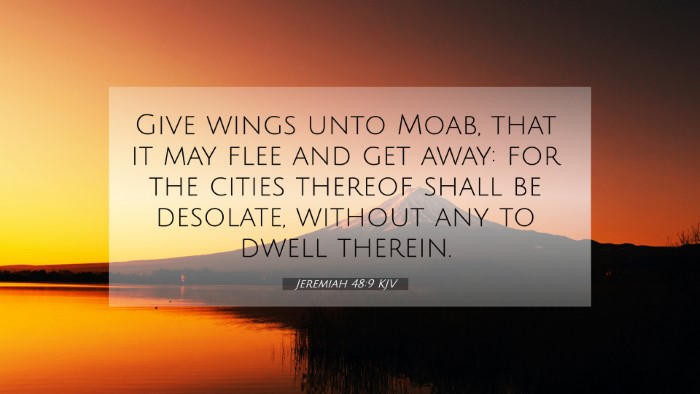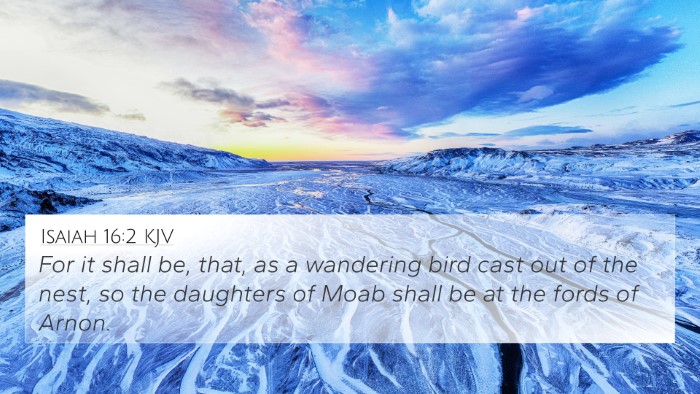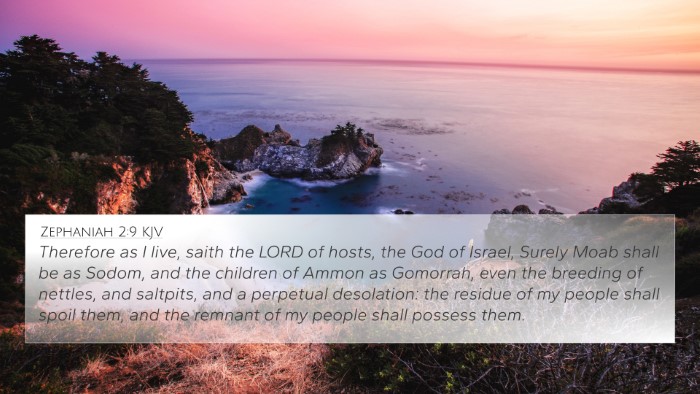Understanding Jeremiah 48:9
Verse: Jeremiah 48:9 states, "Give wings unto Moab, that it may flee and get away: for the cities thereof shall be desolate, without any to dwell therein."
Contextual Overview
This verse is situated within a prophecy concerning Moab, a nation that was frequently at odds with Israel. Here, God, through the prophet Jeremiah, pronounces judgment upon Moab due to its sins, including pride and idolatry.
Summary of Commentary Insights
The insights derived from commentaries by Matthew Henry, Albert Barnes, and Adam Clarke help illuminate this verse more fully:
- Matthew Henry: Henry emphasizes God's impending judgment on Moab, suggesting that the call for "wings" illustrates the urgency for escape due to the dire situation Moab would face. The desolation of its cities signals a complete turn away from the safety and prosperity Moab once enjoyed.
- Albert Barnes: Barnes highlights the metaphor of flight and wings, indicating the swift downfall Moab is about to face. The emphasis on cities becoming desolate underscores a broader theme of divine retribution as a result of their actions against God and His people.
- Adam Clarke: Clarke notes the symbolic representation of Moab’s flight as an act of desperation, detailing how the loss of habitation reflects the withdrawal of God’s protection. He connects this desolation with the concept of judgment throughout the biblical narrative, asserting that such themes are recurrent in the prophetic literature.
Biblical Cross-References
The understanding of Jeremiah 48:9 is enriched by cross-referencing with several other Biblical texts:
- Isaiah 15:1-9: This passage also describes the devastation of Moab and parallels the judgment detailed in Jeremiah.
- Ezekiel 25:8-11: Here, the prophecy against Moab highlights similar themes of destruction and abandonment.
- Zephaniah 2:8-10: This text reinforces God's judgment on Moab and the destitution that will follow.
- Jeremiah 48:1: The introduction of the prophecy against Moab is essential for understanding the context of the judgment to come.
- Amos 2:1-3: This discusses God’s judgment upon the nations, including Moab, for idolatry and transgressions.
- Deuteronomy 23:3: Moab's historical relationship with Israel is noted, which makes their subsequent judgment more poignant.
- Psalms 60:8: The Psalms represent a cry of lamentation that can be associated with the desolation of Moab in Jeremiah.
- Matthew 7:26-27: Christ references building on the sand versus a solid foundation, allowing for thematic connections regarding stability and judgment.
- Revelation 18:2: The complete desolation and destruction of cities by divine judgment can also be compared to the fate of Moab.
- Micah 4:10: The connections between judgment and future restoration resonate with the message found in Jeremiah.
Connections Between Bible Verses
This verse and its surrounding context illustrate a significant aspect of Biblical theology—the theme of God's judgment against nations that oppose Him. Cross-referencing with passages from both the Old and New Testaments showcases how interconnected the message of the prophets is with the teachings of Christ and the ultimate judgment at the end times.
Thematic Bible Verse Connections
The themes present in Jeremiah 48:9—desolation, judgment, and the urgent call to flee—parallel many other scriptural references that deal with the consequences of sin and the hope of redemption. Engaging with these passages through cross-referencing allows a deeper understanding of biblical consistency and the nature of God's justice.
Analytical Approach to Cross-Reference
To effectively use a Bible cross-reference guide, the following methods are encouraged:
- Identify Keywords: Look for key themes or repeated words like "judgment" and "desolation" to find related verses.
- Thematic Study: Group verses by theme, such as prophecies of judgment or redemptive possibilities.
- Comparative Analysis: Assess the similarities and differences among verses, enhancing overall comprehension.
- Contextual Understanding: Always consider the broader narrative when cross-referencing to maintain theological coherence.
Conclusion
Jeremiah 48:9 serves as a profound reminder of the realities of divine judgment, the dire consequences of sin, and the call for repentance. By utilizing tools for cross-referencing biblical texts, one can uncover the rich landscape of scripture that interlinks various narratives, emphasizing God’s character and His relationship with humanity.









